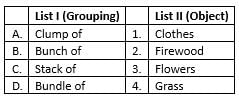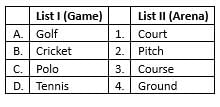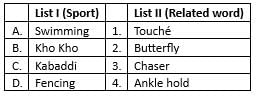Test: English Mock Test - 3 - CDS MCQ
30 Questions MCQ Test - Test: English Mock Test - 3
Directions: Each item in this section consists of a sentence with an underlined word followed by four words or groups of words. Select the option that is opposite in meaning to the underlined word and mark your response.
He was effusive in his praise.
Directions: Each of the following items in this section consists of a sentence, parts of which have been jumbled. These parts have been labelled as P, Q, R and S. Given below each sentence are four sequences, namely (a), (b), (c) and (d). You are required to re-arrange the jumbled parts of the sentence and mark your response accordingly.
encompassing a great many / P has been eclectic / Q historically and culturally Indian society / R differences and contradictions / S
| 1 Crore+ students have signed up on EduRev. Have you? Download the App |
Directions: Each item in this section has a sentence with three underlined parts labelled as (a), (b) and (c). Read each sentence to find out whether there is any error in any underlined part and indicate your response against the corresponding letter, i.e., (a) or (b) or (c). If you find no error, your response should be indicated as (d).
Mr. Malhotra is a historian / a. who's books / b. have won international acclaim. / c. No error / d.
Directions: In this section, each item consists of six sentences of a passage. The first and sixth sentences are given as S1 and S6. The middle four sentences in each have been jumbled up and labelled as P, Q, R and S. You are required to find the proper sequence of the four sentences and mark your response.
S1 : Gaganyaan is a national programme wherein ISRO is leveraging the domain expertise of various agencies for expediting its execution.
S6 : It will lay the foundation for a sustained Indian human space exploration programme in the long run.
P : With this programme, a new vertical has been created within ISRO to steer this growth.
Q : The Gaganyaan Programme marks an inflection point in the growth profile of India's space endeavour.
R : This new vertical envisages undertaking the demonstration of human space flight to Low Earth Orbit in the short-term.
S : A new ISRO centre, Human Spaceflight Centre has been formed for Low Earth Orbit flights.
The correct sequence should be:
Directions: Each of the following sentences has a word/words underlined. Read the sentence carefully and find which word class the underlined word/words belongs/belong to.
His only answer was a grunt.
Directions: Each item in this section has a sentence with three underlined parts labelled as (a), (b) and (c). Read each sentence to find out whether there is any error in any underlined part and indicate your response against the corresponding letter, i.e., (a) or (b) or (c). If you find no error, your response should be indicated as (d).
Some people / a. could write well / b. while others didn't. / c. No error / d.
Directions: Each of the following sentences in this section has a blank space with four options. Select whichever preposition or determiner you consider the most appropriate for the blank space and indicate your response.
I have _______ energy left to complete the work.
Which of the following does not amount to historical analysis?
Directions: Each of the following items in this section consists of a sentence, parts of which have been jumbled. These parts have been labelled as P, Q, R and S. Given below each sentence are four sequences, namely (a), (b), (c) and (d). You are required to re-arrange the jumbled parts of the sentence and mark your response accordingly.
in this endeavour / P gender budgeting is a critical strategy / Q is central to mitigate gender inequalities and / R financing for gender equality / S
According to the passage, how should a walking tour conclude?
Directions: In the following items, you are required to select the most appropriate voice of the given phrase and mark your response from the options that follow.
Change from Passive to Active voice : Sujata was advised by her mother to carry an umbrella while stepping out into the rain
Directions: In the following items, a word is given, followed by two suggested meanings. You are required to identify the correct meaning of the word and indicate your choice by using the code that follows:
'Anarchism'
1. Absence of government and/or authority
2. Chaos and disorder in the absence of government
Directions: Each item in this section has a sentence with three underlined parts labelled as (a), (b) and (c). Read each sentence to find out whether there is any error in any underlined part and indicate your response against the corresponding letter, i.e., (a) or (b) or (c). If you find no error, your response should be indicated as (d).
The police are working hard / a. until they are able to / b. arrest the culprits. / c. No error / d.
Directions: In the following items, a sentence is given with one or more underlined words. From the options provided mark the correct answer from among (a), (b) or (c), which is the most appropriate improvement over the word(s) to be substituted. If no improvement can be identified, mark your response as (d).
The group was accused of biased participation in the discussion because their entire attention was centred around their own proposal.
Directions: In the following items, two lists of words are provided. You are required to match the associations between List I and List II and mark your answer using the given code.
Match List I with List II:

Directions: Each item in this section has a sentence with three underlined parts labelled as (a), (b) and (c). Read each sentence to find out whether there is any error in any underlined part and indicate your response against the corresponding letter, i.e., (a) or (b) or (c). If you find no error, your response should be indicated as (d).
Either Vikas (a) / or his friends (b) / is going to cook dinner.(c) / No error (d)
Directions: Each item in this section has a sentence with three underlined parts labelled as (a), (b) and (c). Read each sentence to find out whether there is any error in any underlined part and indicate your response against the corresponding letter, i.e., (a) or (b) or (c). If you find no error, your response should be indicated as (d).
A boy was injured / a. in the accident and was taken / b. onto hospital. / c. No error / d
Directions: Given below are some idioms/phrases followed by four alternative meanings to each. Choose the response (a), (b), (c) or (d), which is the most appropriate meaning and mark your response.
Play devil's advocate
According to the passage, what can adversely affect the walking tour?
Directions: Each of the following sentences has a word/words underlined. Read the sentence carefully and find which word class the underlined word/words belongs/belong to.
To swim every day is good for health.
Directions: Each of the following sentences in this section has a blank space and is followed by four choices. Select the most appropriate choice to fill in the blank.
The country _______ several economic changes in the past two decades.
Directions: In this section, each item consists of six sentences of a passage. The first and sixth sentences are given as S1 and S6. The middle four sentences in each have been jumbled up and labelled as P, Q, R and S. You are required to find the proper sequence of the four sentences and mark your response.
S1 : Press Trust of India (PTI) is a non-profit making cooperative owned by the country's newspapers with a mandate to provide effective and unbiased news to all subscribers.
S6 : Increasingly, more and more subscribers are opting for satellite reception.
P : It offers its news services in English and Hindi languages.
Q : Over 500 newspapers and several news services subscribe to PTI, including many overseas news entities.
R : PTI now has its own satellite delivery system.
S : Bhasha is the Hindi language news service of the agency.
The correct sequence should be:
Directions: Each of the following sentences in this section has a blank space and is followed by four choices. Select the most appropriate choice to fill in the blank.
Those medicines, _______ are used to treat kidney infection, have been withdrawn from the market.
Directions: In the following items, two lists of words are provided. You are required to match the associations between List I and List II and mark your answer using the given code.
Match List I with List II:

Directions: Each item in this section has a sentence with three underlined parts labelled as (a), (b) and (c). Read each sentence to find out whether there is any error in any underlined part and indicate your response against the corresponding letter, i.e., (a) or (b) or (c). If you find no error, your response should be indicated as (d).
Everything / a. what happened / b. was because of my actions. / c. No error / d.
Directions: In the following items, two lists of words are provided. You are required to match the associations between List I and List II and mark your answer using the given code.
Match List I with List II:

Directions: Each of the following sentences in this section has a blank space and is followed by four choices. Select the most appropriate choice to fill in the blank.
She suffered _______ pain because of the leg injury.
Directions: Each of the following items in this section consists of a sentence, parts of which have been jumbled. These parts have been labelled as P, Q, R and S. Given below each sentence are four sequences, namely (a), (b), (c) and (d). You are required to re-arrange the jumbled parts of the sentence and mark your response accordingly.
than interpreting it / P combating poverty continues / Q understanding poverty is more important / R to elude humanity because / S
Directions: In the following items, a word is given, followed by two suggested meanings. You are required to identify the correct meaning of the word and indicate your choice by using the code that follows:
'Enormity'
1. The fact of something being serious and grave
2. Abominable crime or sin
Directions: Given below are some idioms/phrases followed by four alternative meanings to each. Choose the response (a), (b), (c) or (d), which is the most appropriate meaning and mark your response.
Be in the same boat

















